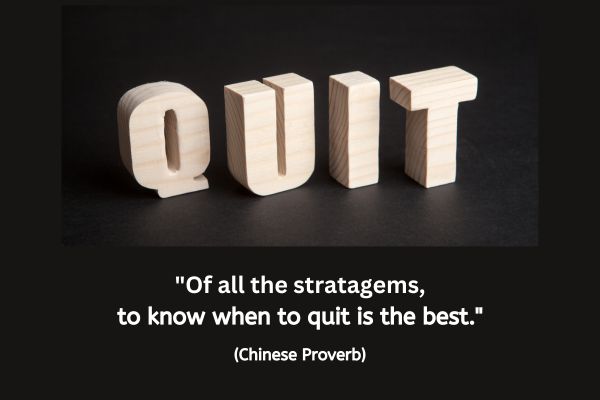Understanding Why Clients Struggle to Quit a Project

Today’s quote is actually a proverb:
“Of all the stratagems to know when to quit is the best.” (Chinese proverb)
This may seem like common sense at times, but I’m sure we’ve all been in situations where, with the benefit of hindsight, we missed the signs of quitting something at an earlier stage. I suspect that you’ve seen clients continue with something long after it seemed obvious to you, with your external perspective, that they just weren’t seeing quitting as an option.
So, what are some of the reasons why someone may not “quit”?
Thinking quitting will mean something about their own worth/identity: It’s not uncommon for someone to have deeply held beliefs around what quitting will mean about their identity. They may be living by a huge set of unconscious rules of how they should behave, and quitting something just isn’t in line with those restrictions.
Fear of Failure: One of the primary reasons clients hesitate to quit is the fear of failure. They may worry about what others will think or feel a sense of shame or inadequacy. As coaches, it’s essential to create a safe and non-judgmental space where clients can explore these fears openly.
Attachment to Comfort Zone: Clients may resist quitting because they’re accustomed to the familiarity and predictability of their current situation, even if it’s not serving them. As coaches, we can gently challenge our clients to expand their comfort zone and explore new possibilities.
External Expectations: Clients may feel pressure to persist in their endeavors due to external expectations from family, friends, or society. They may fear disappointing others or feel obligated to fulfill certain roles or responsibilities. As coaches, it’s important to help clients distinguish between their own desires and the expectations imposed upon them by others. By encouraging them to align their actions with their authentic values and aspirations, we can empower them to make choices that honor their true selves.
Sunk Cost Fallacy: The sunk cost fallacy refers to the tendency to continue investing in a failing endeavor because of the resources already committed, even when it’s clear that the investment is unlikely to pay off. Clients may resist quitting because they’re reluctant to admit that their efforts have been in vain. As coaches, we can help clients recognize the fallacy of this thinking and encourage them to focus on the future rather than dwelling on past investments. You will no doubt have your own approach to this; personally, I favor helping a client see their own worth is not connected with whatever the endeavor is.
Perceived Lack of Alternatives: Clients may believe that quitting is the only option available to them, leading them to feel trapped in their current situation. Helping clients explore alternative paths and possibilities can empower them to see quitting as a choice rather than a dead end.
Uncertainty about the Future: Fear of the unknown can also play a significant role in resistance to quitting. Clients may worry about what lies ahead if they choose to quit, leading them to cling to the familiarity of their current circumstances. Assisting clients in reframing uncertainty as an opportunity for growth and exploration can alleviate this fear.
External Validation: Some clients may rely heavily on external validation and approval from others. They may fear losing the admiration or respect of their peers if they choose to quit, leading them to prioritize external validation over their own well-being. Encouraging clients to cultivate self-validation and trust in their own judgment can help them overcome this obstacle.
What else should go on this list? Add your thoughts in the comments below.
About Jen Waller

Jen Waller is on a mission to support, nurture and encourage coaching skills and talents from non-coach to coach and beyond.
As an experienced coach and trainer Jen is happy to utilise all skills at her disposal to assist clients from getting out of their own way and making a difference in the world with their coaching. Find out more about the support Jen offers here.
